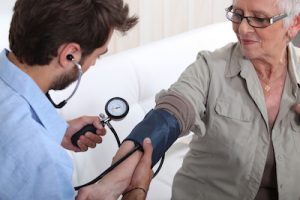As you age, it is important to take care of your health even more. One way to help ensure a healthy aging process is by going to the doctor for regular visits. This is especially important to do once you have hit the age of 45 and beyond.
The Importance Behind Health Checks
Once you hit the age of 45 your body is nearing or already in the transition of menopause or andropause. There are screenings and vaccinations that you should do at certain ages from this point on to help ensure your health. Your body is going through a rather large change when menopause or andropause begins to occur. These changes can cause issues if not found quickly.
Screenings for your late 30s
Once you hit the age 35 you should begin to have your cholesterol checked every year. five years. As high cholesterol can lead to your arteries narrowing, a stroke, or a heart attack.
Women should also begin checking their breasts for lumps or abnormalities at home at this time to detect any possible concerns for breast cancer. It is also important for women to have regular pelvic exams for early prevention of cancers like cervical cancer.
HPV can affect many women, it peaks in women in their 20s and can begin to decline in their late 30s. However, a second peak has been shown to begin between the ages of 35-60 years old. Having yearly screenings for this during your pelvic exam will help with early detection.
Screenings for Your 40s
Once you hit 40, you should begin to have your blood pressure checked every year. High blood pressure can lead to a number of illnesses, thats why it is important that the levels are within the normal range. Maintaining a healthy blood pressure can help you to avoid further complications in the future.
You are also more at risk for developing diabetes at this age. It is good to get screened for pre-diabetes or diabetes beginning now. Screening for this would include testing your blood sugar and blood-glucose levels. Studies show that one third of people over 45 are prediabetic.
This is especially important if you have any of the following:
- Are overweight or obese
- Have a close relative with diabetes
- Are of Chinese, South Asian, African-Caribbean or black African descent
Around the age of 40 it might be time to start thinking about doing a colonoscopy. This is especially the case if you have a family history of colorectal cancer.
At the age of 40, sun damage begins to add up, so it is time to take a trip to the dermatologist for a full-body skin check. Melanoma is more likely to hit men before the age of 50 than it is women. This is usually because men are not as likely to go in for a screening as women are.
Screenings for your 50s

Osteoporosis, where your bones become weaken and brittle, can become an issue for women going through menopause. Women who smoke, drink, don’t regularly exercise, and are underweight are even more at risk. Having a DEXA scan done can test your bone density and risk for osteoporosis.
Once men hit their 50s, urinary symptoms can begin. Symptoms could include a weak stream, incontinence, and getting up multiple times at night to pee. Going to your Primary Care doctor to get tested can help to determine if any symptoms could indicate cancer if you are concerned.
If you notice that you are having fewer or soften erections, you should discuss this with your doctor. Erectile issues can often be an early sign of heart disease. It may also be a sign for issues such as hormonal imbalances, depression, anxiety, and even lack of sleep. A prostate cancer screening, PSA blood test, can also be done as it is the second-deadliest cancer among men.
Screenings for your 60s
Once you hit the age of 60 you should get a free NHS eye test. This test is recommended to have every two years.
In your 60s, bowel cancer becomes a higher risk for both women and men. The NHS offers free home testing kits for people between the ages of 60 – 74, a test, which helps to detect invisible blood in stool samples.
For men, once you hit the age of 65 you should be tested for AAA, abdominal aortic aneurysm. This is a condition where the main blood vessel that leads away from the heart and can become swollen.
Vaccines as you Age
We have put together a list of vaccines that you will want to make sure that you stay current on throughout your aging process:
- Influenza – this is an annual shot that will help to reduce your risk of the flu.
- Pneumonia – if you have diabetes, HIV, and sickle cell disease you should get this vaccination, as well as once you hit the age of 65
- Tetanus-Diphtheria (TD) – you receive this original vaccination during childhood, however you should continue to get a booster shot every ten years. Once you hit the age of 50, it is an excellent time to get this booster as it will help to prevent the recurrence of whooping cough
- Hepatitis A, Hepatitis B, and Meningitis – women that are both premenopausal and postmenopausal that travel to exotic places should get these vaccinations before doing so.
Cognitive Assessment
As you age, your thinking and memory abilities should be regularly tested during your check-ups. This is especially important because 50 million people worldwide have dementia. Alzheimer’s, the most relevant type, affects 5.8 million people in the United States alone. While there is no cure, there are treatments that can help to ease the symptoms.
It is normal to experience some slowing of your memory as you age, but more significant declines in behavior or thinking skills point towards requiring mental skills.
Overall
It is important to continue your regular health checks throughout your life. It will help to prevent some medical issues or complications. This will help you to live a healthier and more enjoyable life!





